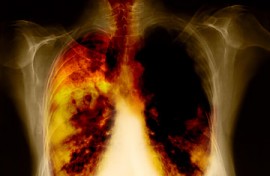
Scientist in the US found out the genetic change that makes lung cancer to more likely spread around a human body.
The new finding was first published in the journal Nature. This opens an opportunity for the scientist to be able to create new medicine to fight secondary tumors.
The study was first conducted in mice but has been confirmed in human tumor samples.
According to a cancer charity in United Kingdom, the new discovery will likely help in developing better treatments for patients who have cancer.
Researchers used mice that was programmed to develop lung tumors and has observed the genetic change in it.
In their research they have found out that there is a reduced activity of the gene NKX2-1 in samples from human lung tumors and this reduction is (–foul word(s) removed–)ociated with higher death rates.
Monte Winslow, lead author of the paper from the David H Koch institute from integrative Cancer Research at MIT have acknowledge the significance of the new study that will help scientist in understanding the role of the genes and eventually develop new drugs fro cancer.
He also added that the sad reality is that if you could tell a patient whether their cancer has turned down this gene, you would know they will have a worse outcome, but it wouldn’t change their treatment.
The gene codes for a protein that switches other genes on and off.
Genes that switched off in cancerous cells are more likely aggressive and greater possibility to break off from the lungs and spread around the body.
One of the senior science information officers at the Cancer Research UK, Nell Barrie said that lung cancer is one of the leading problem worldwide, and this discovery and understanding on how the lung cancer are developed and spread out through the body is vital for developing better and more personalized treatments.
He added that the research like this is helping to unravel the genetic ‘signatures’ of different cancers, and will spark ideas for new ways to tackle the disease.
